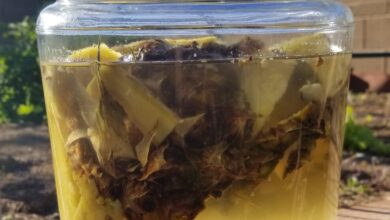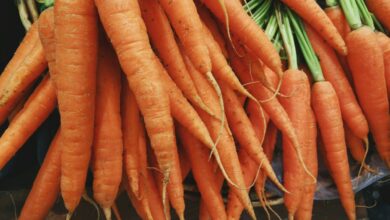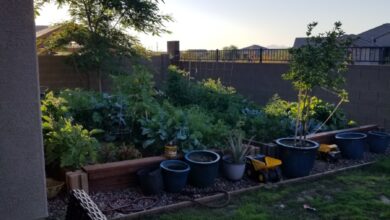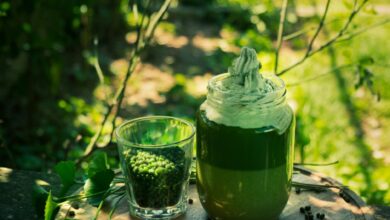Homemade Fertilizer Made Using Commonly Available Herbs.

Using herbal fertilizers in gardening offers numerous benefits, ranging from promoting plant health to fostering environmental sustainability. Here are some key advantages of incorporating herbal fertilizers into your gardening practices:
Natural Nutrient Source:
Herbal fertilizers are derived from natural sources such as herbs, plants, and organic materials. These fertilizers provide plants with a diverse array of essential nutrients, including nitrogen, phosphorus, potassium, and micronutrients. By delivering nutrients in a form that plants readily recognize and absorb, herbal fertilizers promote healthy growth and development.
Soil Enrichment:
Herbal fertilizers contribute to soil fertility and health by replenishing essential nutrients and improving soil structure. Organic matter present in herbal fertilizers helps retain moisture, enhance soil aeration, and foster beneficial microbial activity. Over time, the regular application of herbal fertilizers can improve soil fertility, making it more conducive to plant growth and reducing the need for chemical inputs.
Reduced Environmental Impact:
Unlike synthetic fertilizers, which may contain harmful chemicals and contribute to water and soil pollution, herbal fertilizers are environmentally friendly and sustainable. By utilizing natural ingredients, herbal fertilizers minimize the risk of chemical runoff, protecting waterways and ecosystems from contamination. Additionally, the production and use of herbal fertilizers result in lower carbon emissions, supporting efforts to mitigate climate change.
Safe for Beneficial Organisms:
Herbal fertilizers pose minimal risk to beneficial organisms such as earthworms, insects, and microorganisms that play vital roles in soil health and ecosystem functioning. Unlike synthetic fertilizers, which can disrupt soil ecosystems and harm beneficial organisms, herbal fertilizers support a diverse and balanced soil microbiome. This, in turn, contributes to improved nutrient cycling, pest resistance, and overall ecosystem resilience.
Cost-Effective and Sustainable:
Herbal fertilizers offer a cost-effective and sustainable alternative to commercial fertilizers. Many herbal fertilizers can be made using readily available ingredients such as kitchen scraps, compost, and common herbs, reducing the need for expensive chemical inputs. By recycling organic materials and harnessing the power of nature, gardeners can create their own fertilizers at minimal cost, promoting self-sufficiency and sustainability.
Customizable Formulations:
One of the advantages of herbal fertilizers is their versatility and customizability. Gardeners can tailor their fertilizer formulations to meet the specific needs of different plants, soil types, and growing conditions. Whether enriching the soil with nitrogen-rich nettle tea or providing phosphorus and potassium with comfrey compost, herbal fertilizers offer flexibility and adaptability to support plant health and vitality.

Using herbal fertilizers in gardening offers a host of benefits, including natural nutrient supply, soil enrichment, reduced environmental impact, safety for beneficial organisms, cost-effectiveness, and customizable formulations. By harnessing the power of nature and embracing sustainable practices, gardeners can cultivate healthy, thriving gardens while minimizing their ecological footprint. Here are a few recipes to maximize the potential in your garden.
1. Nettle Fertilizer:
Nettle is a nutrient-rich herb that can be transformed into a potent fertilizer for your plants. To make nettle fertilizer, gather a bunch of fresh nettle leaves (wear gloves to avoid stings), chop them into small pieces, and place them in a large container. Cover the leaves with water and let the mixture ferment for a few weeks, stirring occasionally. Once fermented, dilute the nettle tea with water (about 1 part tea to 10 parts water) and use it to water your plants. This fertilizer is particularly high in nitrogen, making it ideal for leafy greens and other nitrogen-loving plants.
2. Comfrey Compost Tea:
Comfrey is known for its deep-rooted ability to mine nutrients from the soil. To create comfrey compost tea, gather comfrey leaves and chop them finely. Place the chopped leaves in a container and cover them with water. Allow the mixture to steep for several weeks, stirring occasionally. The resulting tea will be rich in potassium, phosphorus, and other nutrients essential for plant growth. Dilute the tea with water before using it to water your plants, providing them with a nourishing boost.
3. Chamomile Infused Fertilizer:
Chamomile is celebrated for its soothing properties, but it can also be utilized as a fertilizer for your garden. To make chamomile-infused fertilizer, collect dried chamomile flowers and steep them in water for a few days. Strain the liquid and dilute it with water before applying it to your plants. Chamomile fertilizer is gentle yet effective, promoting healthy growth and blooming in flowers and herbs.

4. Basil Leaf Mulch:
Basil not only enhances the flavor of your dishes but can also be repurposed as a nutrient-rich mulch for your garden. After harvesting basil leaves for culinary purposes, shred the leftover stems and leaves into small pieces. Spread this basil mulch around the base of your plants to help retain moisture, suppress weeds, and enrich the soil as it decomposes. As the basil breaks down, it releases essential nutrients, providing a natural fertilizer for your plants.
5. Dandelion Root Fertilizer:
Dandelions, often viewed as pesky weeds, can be transformed into a beneficial fertilizer for your garden. Dig up dandelion roots from your lawn or garden and wash them thoroughly. Chop the roots into small pieces and steep them in water for a few weeks. Strain the liquid and dilute it with water before using it to water your plants. Dandelion root fertilizer is rich in potassium and other minerals, promoting strong root development and overall plant health.
These examples demonstrate how readily available herbs can be repurposed into homemade fertilizers, providing plants with essential nutrients while minimizing reliance on synthetic chemicals. Experiment with different combinations and methods to discover the most effective fertilizers for your garden’s needs.

Highlight-Worthy Gatherings
Using homemade fertilizer in gardening can contribute to positive health outcomes in several ways:
1. Nutrient-Rich Produce:
Homemade fertilizers derived from natural sources such as herbs and compost provide plants with a diverse array of essential nutrients. When plants absorb these nutrients, they incorporate them into their tissues, resulting in produce that is rich in vitamins, minerals, and antioxidants. Consuming nutrient-rich fruits and vegetables grown with homemade fertilizer can support overall health and well-being by providing essential nutrients for bodily functions and disease prevention.
2. Reduced Chemical Exposure:
Commercial fertilizers often contain synthetic chemicals and additives that may be harmful to human health if ingested or absorbed through the skin. By using homemade fertilizers made from natural ingredients, gardeners can minimize exposure to potentially harmful chemicals and toxins. This reduction in chemical exposure contributes to a safer and healthier gardening environment for both gardeners and consumers.
3. Enhanced Soil Health:
Homemade fertilizers contribute to soil health by enriching the soil with organic matter, beneficial microbes, and essential nutrients. Healthy soil supports the growth of strong, resilient plants that are more resistant to pests and diseases. Additionally, nutrient-rich soil promotes microbial activity, which plays a crucial role in nutrient cycling and soil fertility. Gardening in soil enriched with homemade fertilizer can promote microbial diversity and soil ecosystem balance, which are essential for plant health and human well-being.
4. Physical Activity and Stress Reduction:
Engaging in gardening activities, including the preparation and application of homemade fertilizer, offers numerous physical and mental health benefits. Gardening is a form of moderate physical activity that promotes flexibility, strength, and cardiovascular health. Spending time outdoors in nature and tending to plants can also reduce stress, anxiety, and depression, leading to improved mental well-being. Incorporating homemade fertilizer into gardening routines provides an opportunity for relaxation, mindfulness, and connection with the natural world, which are all conducive to positive health outcomes.
5. Environmental Stewardship:
Choosing homemade fertilizer over commercial alternatives aligns with principles of environmental stewardship and sustainability. Homemade fertilizers are typically made from locally sourced, renewable materials, reducing the carbon footprint associated with production, transportation, and disposal. By adopting sustainable gardening practices, such as using homemade fertilizer and composting organic waste, gardeners can contribute to environmental conservation efforts and promote a healthier planet for future generations.

Using homemade fertilizer in gardening offers numerous positive health reasons, including the promotion of nutrient-rich produce, reduced chemical exposure, enhanced soil health, physical activity and stress reduction, and environmental stewardship. By embracing natural fertilizers and sustainable gardening practices, individuals can support their own health and well-being while also contributing to the health of the environment and communities.
















